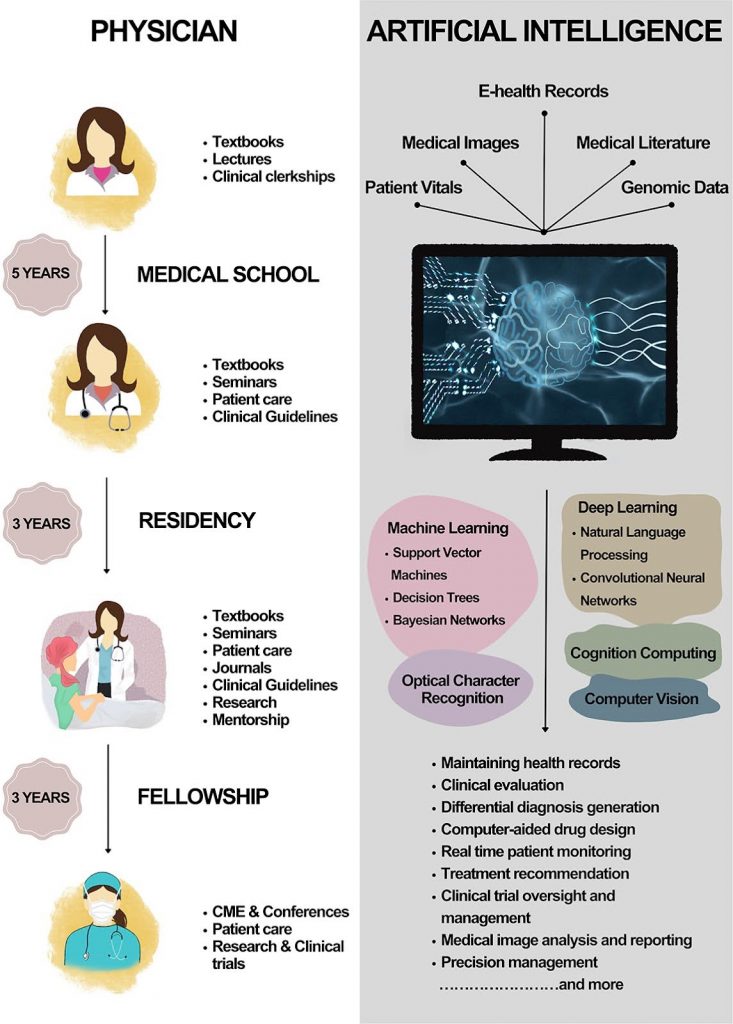
### The Impact of Artificial Intelligence on Health Care and Medicine
Artificial Intelligence (AI) is rapidly transforming the field of medicine and health care. Once a concept limited to science fiction, AI has developed into a vital resource that affects various sectors of society. From finance and tailored marketing to intelligent living spaces and sports officiating, AI is changing the game across numerous industries. In the realm of healthcare, its integration evokes a blend of enthusiasm and apprehension, as professionals consider its revolutionary potential alongside concerns about privacy, transparency, and ethical implications.
#### The Growing Influence of AI in Medicine
Eric Topol’s book *Deep Medicine* (2019) predicted a bright outlook for AI within health care, envisioning technologies that could reduce administrative chores, improve diagnostic precision, and transform the dynamic between patients and doctors. Since then, Topol’s predictions have come to fruition in several avenues:
– **Digital Scribes**: AI-enabled digital scribes are being introduced in healthcare facilities to automate note-taking, alleviating the paperwork burden on doctors and allowing more focus on patient care.
– **Diagnostic Precision**: AI applications are proving valuable in areas such as diagnostic radiology, pathology, and ophthalmology. These tools swiftly analyze medical images and laboratory results, frequently detecting patterns that human eyes may overlook.
– **Coaching for Empathy**: Research indicates that AI might elicit more empathetic responses than some healthcare providers in certain contexts. AI is also being harnessed to train clinicians in improving their interpersonal skills, addressing challenges in emotionally sensitive situations.
– **Revolution in Drug Discovery**: AI’s role in biomedical research, especially in drug development, is accelerating the formulation of new therapies by simulating potential compounds and predicting their success rates.
#### AI’s Role in Health Insurance and Policy Developments
The health insurance sector is also capitalizing on AI, especially in streamlining prior authorization workflows. However, this efficiency has sparked debate. Recently, California enacted a pivotal law forbidding health insurers from employing AI to deny claims, highlighting the dangers of errors and biases. This underscores the importance of supervision and accountability in AI applications that significantly impact patient care and accessibility.
#### Ethical Issues and Obstacles
Despite its promise, healthcare professionals and legislators are facing essential hurdles in the deployment of AI:
1. **Data Privacy and Security**: Confidential health information is vulnerable to breaches, necessitating strong security protocols.
2. **Transparency of Algorithms**: The decision-making processes of AI systems often remain obscure, undermining trust among healthcare providers and patients.
3. **Bias and Fairness**: AI systems trained on partial or skewed data may harbor biases, worsening inequalities in care delivery.
4. **Reliability and Accuracy**: The clinical safety and efficacy of AI technologies must be regularly assessed to guarantee their practical relevance.
5. **Ethical Regulatory Standards**: As AI evolves swiftly, ethical development and implementation guidelines must coincide with fundamental medical principles of beneficence and justice.
The *American College of Physicians* (ACP) has adopted a forward-thinking approach by releasing a policy document detailing ten principles for AI in healthcare. Central to this framework is the conviction that AI should enhance—not replace—physician decision-making. According to the ACP, AI is expected to act as a supportive resource in tackling healthcare challenges such as clinician shortages and administrative fatigue, while preserving the integrity of the patient-physician relationship.
#### AI as an Enhancement Tool for Physicians
A common concern among both aspiring and established healthcare professionals is the fear that AI technology will make clinicians redundant. However, experts like Dr. Janet A. Jokela, Treasurer of the ACP, contend otherwise. While AI can analyze large volumes of data with impressive accuracy, it lacks the “connection and accountability” that human doctors possess. The relationship between patients and physicians relies on trust, empathy, and ethical deliberation—attributes that AI systems cannot mirror.
#### Ethical Considerations and Ongoing Feedback Loops
The ACP stresses that AI implementations should align with medical ethics. Developers, regulators, and researchers are encouraged to concentrate on health equity, transparency, and results centered around the patient. Ongoing enhancements through feedback are essential to ensure that AI systems evolve in response to the shifting demands of healthcare.
#### Merging AI and Public Health Messaging
AI also has the potential to fight medical misinformation. By refining the clarity and outreach of public health communications, AI might combat skepticism toward established medical science and improve public comprehension of critical matters, such as vaccine efficiency and preventive care.
#### Looking Ahead: AI and Future Innovations
As AI continues to revolutionize healthcare, new technologies like quantum computing are on the horizon. With its capacity to process vast data sets at unmatched speeds, quantum computing may further enhance AI’s capabilities. It is anticipated to usher in significant transformations that go beyond just computational speed, impacting fields such as personalized medicine, genomics, and expansive predictive modeling.
#### Concluding Insights
AI presents both an opportunity and a duty within health care. By harnessing its potential while confronting its ethical and practical challenges, we can redefine the practice of medicine. As Dr. Jokela and others